As new parents, your toddler's first tooth is something to be excited about! Your little one's first tooth (and many more to come!) comes with the responsibility of caring for your child's teeth and scheduling regular dental visits. One of the questions you likely have is when you should take your child to the dentist. The short answer is that your toddler's first visit to the dentist should be around age 1 or 2. Here's what you need to know about caring for baby teeth and making dental visits fun and rewarding for both you and your toddler.
Key Points of Taking Your Toddler to the Dentist
- Some children can be nervous about their first doctor or dentist appointment. It's important to put them at ease before they go.
- Given that their teeth will fall out, their first appointment will be more about creating good dental habits early.
- Consider visiting a pediatric dentist for the first time. The staff and office will usually have a child-centered care approach.
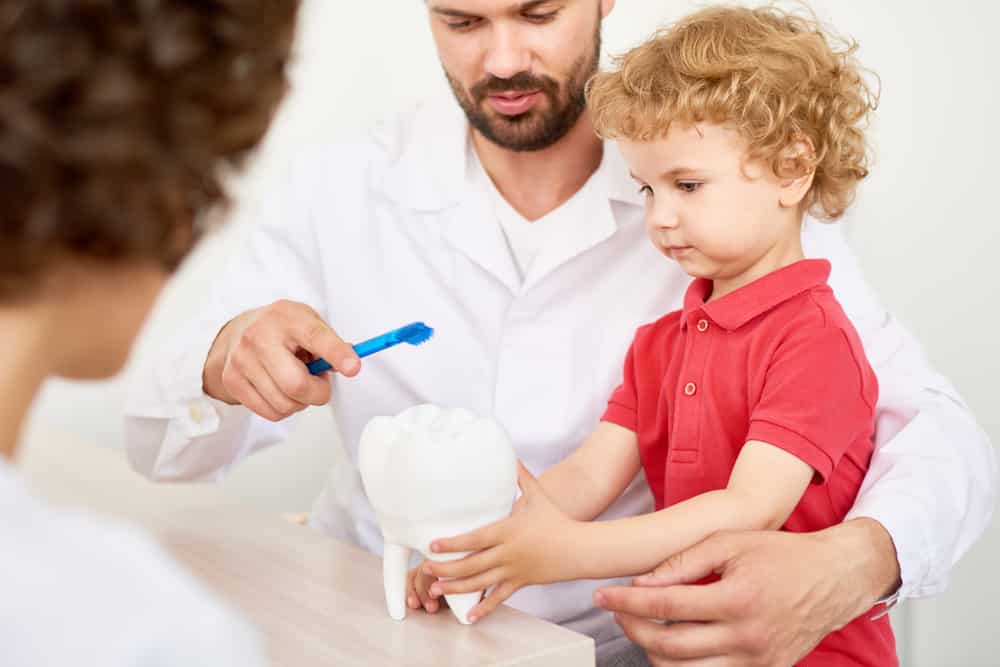
©SeventyFour/Shutterstock.com
When Should I Take My Toddler to the Dentist?
The American Academy of Pediatric Dentistry, American Academy of Pediatrics, and the American Dental Association recommend a child's first visit to be no later than age 1 to 2 when the first tooth erupts. This can happen as early as 3 months of age for some babies. Instead of treating problems, this enables the dentist to prevent and anticipate them. Furthermore, the dentist will assess your child's Caries risk, evaluate bad habits, and tailor a program to each child.
At this age, a cleaning is unlikely to be performed; instead, talk with the dentist about how to best care for your child's teeth and the importance of good oral hygiene. The dentist can also get your child excited about dental health and how everything they do works. This can also help ease any future anxiety about visiting the dentist later in life.
While their baby teeth will fall out to make way for adult teeth, they will set the tone for the future health of your toddler's smile. It is recommended that regular visits (every 6 – 12 months) be made to encourage and teach good oral health habits early in life. When children are young, it is also easier to make them comfortable with dental visits.
What to Expect From Your Visit
The first step is to ensure that your child is at ease. By easing them into the visit, you can reduce their anxiety and increase their willingness to cooperate. A dental clinic with a dedicated kids' playroom that is well-stocked with mostly dental-related toys is usually a good place to start. The clinic staff should adore children as well, so you can relax knowing that by the time your child enters the dental chair, he or she will have made several new best friends! What else can you expect during the appointment?
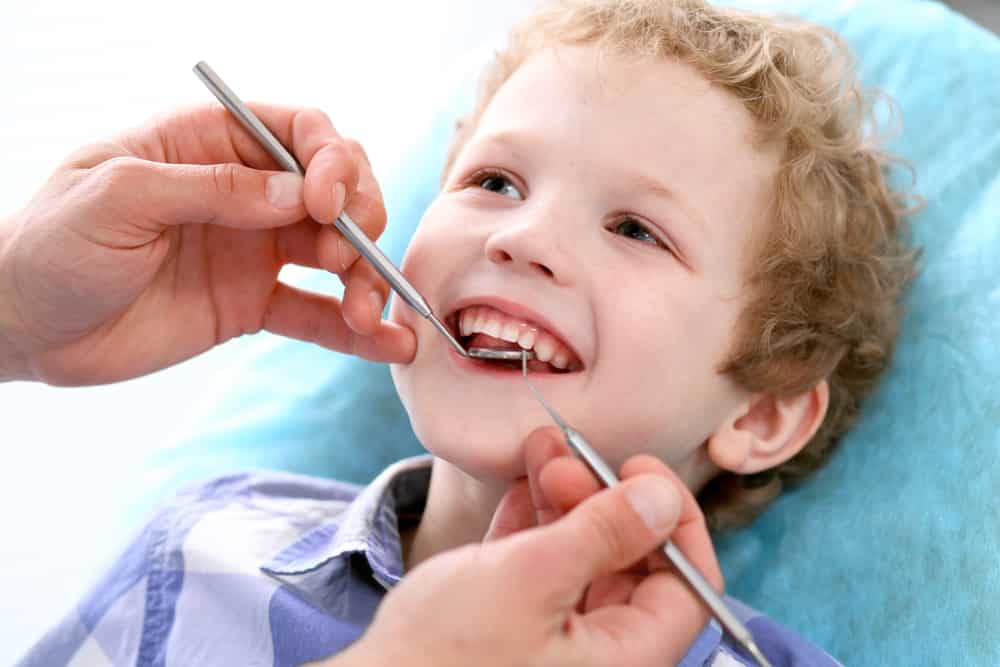
©Andrei_R/Shutterstock.com
- The staff at the dentist's office will take your child's complete medical history
- Taking care of any teething or thumb-sucking issues
- A discussion about brushing, such as how long to brush, what toothpaste and toothbrush to use, and how frequently to brush
- An evaluation of your child's bite and how the teeth should come together
- Expect the dentist to examine your child's mouth to evaluate the jaw, gums, teeth, and any other oral issues such as enamel weaknesses or cavities
- Nutritional tips to keep your toddler's teeth healthy and strong
While a full cleaning may not be performed on the first visit, this initial meeting will pave the way for your child to feel at ease in the dentist's chair. Depending on your child's level of comfort, you may be asked to hold them while the dentist examines their mouth. Following the first visit, you may be asked to step outside so your toddler can gain independence and confidence while also getting to know the dentist and staff on his or her own.
Make Your Child Look Forward to Their Dental Appointments
Making your child feel at ease with the idea of going to the dentist can make a significant difference in reducing their fears. Reading books about going to the dentist in the days leading up to their appointment will show your child that going to the dentist is something everyone does and why it's important to take care of their teeth.
There are numerous children's books on the subject available at your local public library and online. Planning a small reward for your child to look forward to after their dentist visit can also be beneficial. (However, you should probably avoid using candy as positive reinforcement.)
Other rewards could include extra time with their favorite game or reading time. However, you should be careful with using big rewards such as big toys. This might cause a feedback loop of ‘bribery' for lack of a better term and make going to other places or appointments more of a negotiation rather than an important visit.
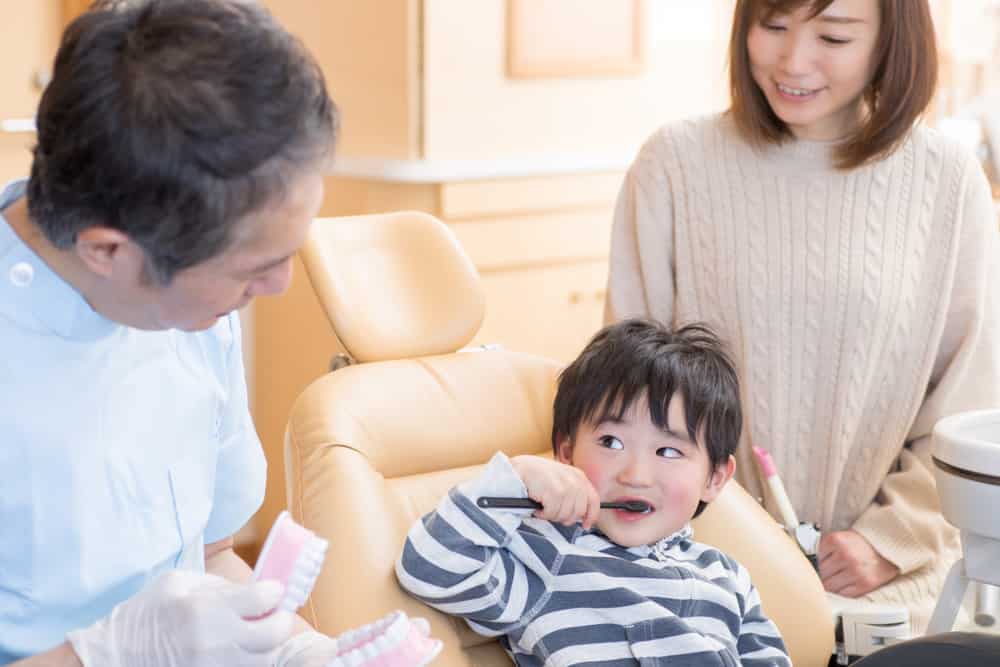
©buritora/Shutterstock.com
Consider Visiting a Pediatric Dentist
It's fine to take your child to the dentist — check with them to see if they treat young children — but not all dental offices are designed to make the experience enjoyable for children. Pediatric dentists treat children exclusively. Pediatric dentists use kid-sized equipment as well as fun distractions and decorations. And, because a child's appointment can be difficult, they frequently have more staff on hand to expedite treatment appointments.
More importantly, pediatric dentists are skilled at making children feel at ease during dental exams and treatments. Building trust is the first step. They may accomplish this by physically approaching your child's level to introduce themselves in order to appear less intimidating and friendly. They will take the time to get to know your child by asking about a favorite cartoon character, a favorite school activity, or simply asking about their day.
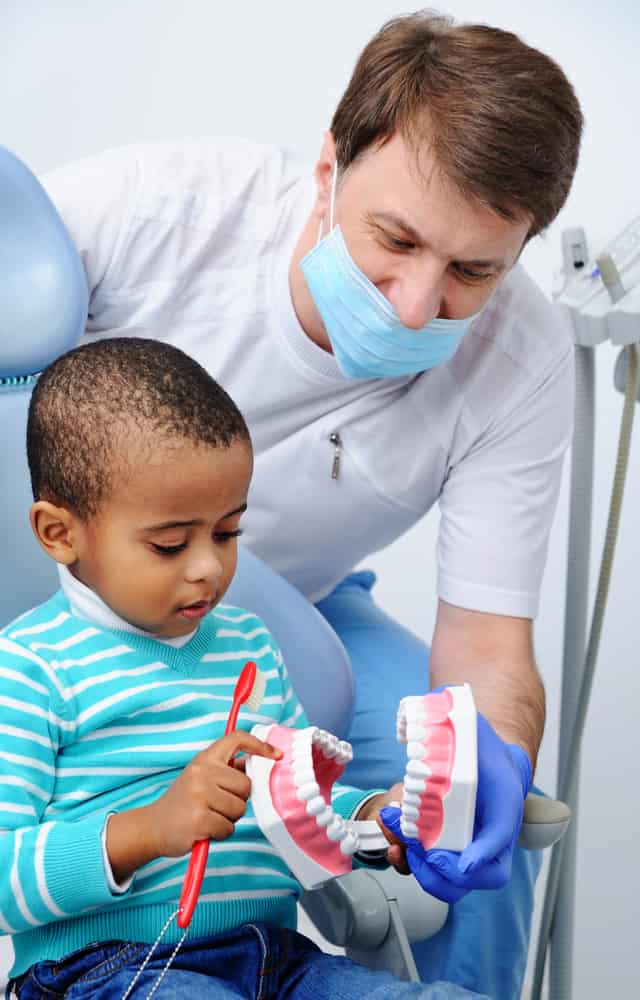
©Evgeniy Kalinovskiy/Shutterstock.com
Instead of technical dental terminology, a pediatric dentist will use kid-friendly words. They may also employ a “tell-show-do” strategy to make your child feel more at ease during the exam. They'll explain what happens next to your child: “I'm going to count your teeth.” Then, by counting their fingers, show them what they're about to do. Then do the counting while, more importantly, inspecting their teeth!
Whether you decide to visit a pediatric dentist or your trusted family dentist, taking your child for regular dental check-ups when they are young is an important way to help your child stay smiling and healthy.
Tips For A Smooth First Visit
Do:
- Instead of delegating this task to relatives and caregivers, accompany your child at least for the first visit
- Discuss your child's first dental appointment with them. Describe what will occur and what the dentist is looking for. Allow them to practice opening their mouth wide
- In terms of oral hygiene, diet, and dental behavior, be a role model for your child
- When making your first appointment, tell the dental staff about your child, including any medical problems or special needs
- During the appointment, try to be encouraging and give your child praise for each step. If your child cries, be understanding and soothing to them, and let the dental professionals guide you. They will do everything possible to make your visit as pleasant as possible
- Plan the appointment around your child's eating and nap times. If the appointment falls right in the middle of their usual nap time, the appointment is almost certain to fail. If it's close to lunchtime, the same thing applies. Working around your child's routine will result in a more enjoyable visit
- Ask questions and express your concerns
Don't:
- Allow anyone to tell your child scary stories about dental visits
- Share your own fears with your child
- Bribe your child to go to the dentist, or use it as a punishment
Keeping Your Toddler's Teeth Healthy
In between dental visits, you can help keep your child's teeth healthy by:
- Providing a variety of nutritious foods and having healthy snacks on hand
- Brushing your child's teeth with a pea-sized amount of low-fluoride toothpaste beginning at 18 months of age. Encourage your child to spit out the toothpaste after brushing his or her teeth
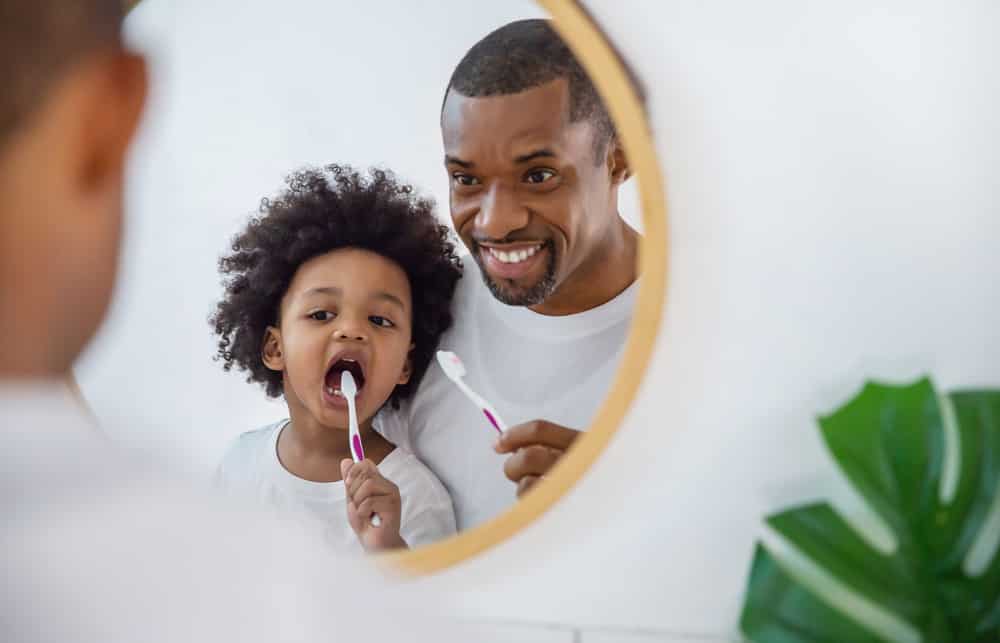
©paulaphoto/Shutterstock.com
- Cleaning your baby's teeth with a soft cloth or a soft toothbrush and water as soon as they appear (usually around 6 months of age)
- Assisting your child in brushing their teeth twice a day, after breakfast and before bed. Do this until they are about seven or eight years old to ensure that every surface is thoroughly cleaned
- Limiting or eliminating sugary foods and beverages, such as flavored milk, fruit juice, soft drinks, sweet biscuits, chocolate, and lollipops, among others, especially between meals
Conclusion
While it is important to take your toddler to the dentist for an assessment of their oral health, it is also critical that both children and parents are at ease with the experience. Resolving any anxieties from the very start will eliminate any fear of the dentist that your toddler may have and will keep them coming back while developing solid habits that will last into adulthood.
The image featured at the top of this post is ©chaponta/Shutterstock.com.
